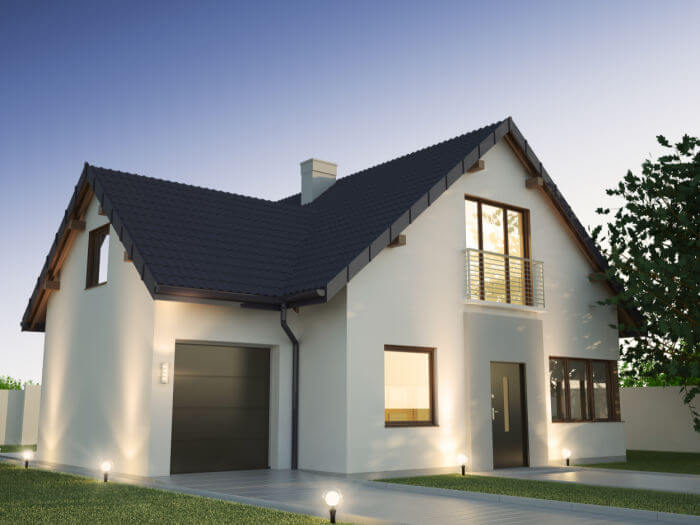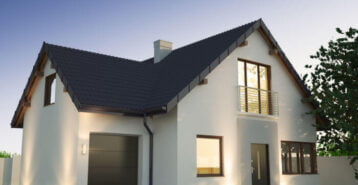Are you doing a door project?
Modernize can pair you with three to four pros in your area, so you can compare options and save time and money.
Three in four Americans plan to stay in their homes for the rest of their lives, according to a recent AARP survey of Americans 50 and older. But a little less than half of them believe it is currently feasible. As we age, our needs change, we have new mobility challenges, and the set-up of our homes must change as a result. Luckily in some cases, there are rebates and incentives to help pay for these modifications. With a little know-how to make your home accessible as you age, it will not only be safer for you as time passes, but allow you to keep that goal of staying in the home you love. Modernize is here to help with this guide to home accessibility modifications to consider for your home’s outdoor areas.
Outdoor Ramps
We may think of ramps only being useful for someone who uses a wheelchair. But they can benefit everyone, especially in intergenerational homes. This includes a parent or grandparent pushing a stroller, or anyone with mobility challenges. If you are considering adding ramps outside your home for accessibility purposes, here are a few pointers:
- Exterior doors. The rule of thumb is that for every inch that a door rises above the ground equals 1 foot of length for the ramp. For example, a door 12 inches above grade requires a ramp that is 12 feet long.
- Side and back door ramps. If the front of your home cannot accommodate the length of ramp needed, or if the front of the home is cumbersome, homeowners also opt to have ramps installed for entry through a side or back door rather than front door.
Entryways and Doorways
Home entryways and doorways are where we greet guests, receive mail drop-offs, and enter and leave the home throughout the day. It is very important that you make modifications to entryways to maintain safety as you age in place. Here are a few home accessibility tips for doorways:
- Maybe you do not feel the need for a ramp. In that case, there are plenty of design-minded railing fixtures that can be installed by the front door to help you up the steps carefully and safely.
- If need be, install a wider door for wheelchair access. According to the ADA, doorways should be at least 32 inches wide to accommodate those in wheelchairs.
- Consider installing a canopy over the front door to avoid getting drenched as you fiddle with your umbrella on rainy days.
- Purchase a non-slip mat for the front door to avoid dangerous slips and falls.
- If bending and kneeling is difficult, put a table by your front door for packages and any other mail that does not fit in your mailbox.
Exterior Lighting
Good lighting around the home is important no matter our age for safety purposes. It is especially crucial as we are and are not quite as nimble on our feet. Here are some tips for safer exterior lighting:

- Driveway lights. Avoid trips and falls by installing outdoor lights not only by the front door, but along the full length of your driveway. This will help guide you in the dark when you take in/out the garbage, check the mail, or return home after dark.
- Face lights downward. It may seem more logical to have lights face outward, but it is actually more effective to face them downward. This way, lights cast less of a shadow, improving visibility. Frosted bulbs will also create less glare.
- Timers. Set your outdoor lights to a timer to help with keeping the exterior of your home well lit, as well as giving you one less flip to switch before bed.
- Motion-sensor lights. These are also helpful to add along your driveway for both visibility and safety. Just set it and forget it.
Home Security Systems
Not only should you love your home, but you should feel safe in it. Home security systems can give you peace of mind about your safety as you age at home. Here are some home security suggestions for outside your home:
Find the Right Contractor for Your Door Project
Whether you’re ready to begin your project now or need some expert advice, our network of contractors are here to help. With a few simple questions, we’ll find the best local professionals for you
- Motion-sensor lights. These are not only helpful for helping guide you to your front door at night, as mentioned above, but also deterring prowlers.
- Chimes and flashing lights. For those who are hard of hearing, consider not only installing a loud doorbell chime, but also have chimes installed throughout the house. This will help ensure you can hear that someone is at the door no matter where you are. If the homeowner has lost their hearing, installing a flashing light can help alert them to a visitor.
- Two-way answering system. An answering system that allows homeowners to not only see who is at the door but also communicate with them can come in handy. This provides ease to those with mobility issues, who may find it inconvenient to get up to answer the door— only to find that it is a solicitor or unwelcome visitor.
Yard
Just because your mobility is not what it used to be does not mean you have to settle for bare landscaping! There are plenty of tips and tricks to keep a beautiful yard that is easy to maintain (and enjoy).
- Raised planters. If kneeling or bending over is difficult, put flowers or vegetables in raised planter boxes to allow you to water them with ease.
- Extendable garden hoses. Purchase light hoses that expand with use, rather than heavy and difficult-to-roll-up rubber hoses. Plus, they’re kink resistant!
- Low maintenance plants. Succulents and other drought-resistant plants require very little maintenance but will add color and personality to your yard.
Pools
Swimming is a great form of exercise that is also not too hard on the joints. If you have a pool, or are considering installing one, keep these pointers in mind for outdoor home accessibility:
- Leave about 4 feet of space around the edge of the pool to allow for wheelchairs and walkers to easily make their way around the pool.
- Consider installing textured flooring that will not get slick to avoid slip and falls.
- Install railings to get in and out of the pool easily. Youngsters who visit will also find this helpful!
- Speaking of little ones, if children live in the home or visit frequently, it may be a requirement to install a fence for safety purposes. Always monitor children near the pool.
Outdoor Home Accessibility: Ask for Help
The biggest tip for aging in place is to not hesitate to ask for help. If there are tasks that are no longer safe for you to do on your own, or you are unsure of how to go about completing a project, leave it to the pros. Modernize has a huge network of qualified contractors for everything from roofing to landscaping, to kitchens and bathrooms. Many have experience in aging in place modifications and will be able to help you get your home to where you need to be.
Find the Right Contractor for Your Door Project
Whether you’re ready to begin your project now or need some expert advice, our network of contractors are here to help. With a few simple questions, we’ll find the best local professionals for you
Reviews from Real Homeowners
Welcome to Homeowner Resources! We are the Modernize blog. Modernize pairs more than 3 million homeowners a year with pre-vetted contractors in their area. This blog started because we believe homeowners should know everything about their homes, from how their HVAC works to which front door colors they might love. On Homeowner Resources, you can find information on every part of your home, right down to how you can negotiate with contractors to get the best price. Here's more about the blog.
Need a contractor? Learn more about how Modernize finds the right pro for you.



